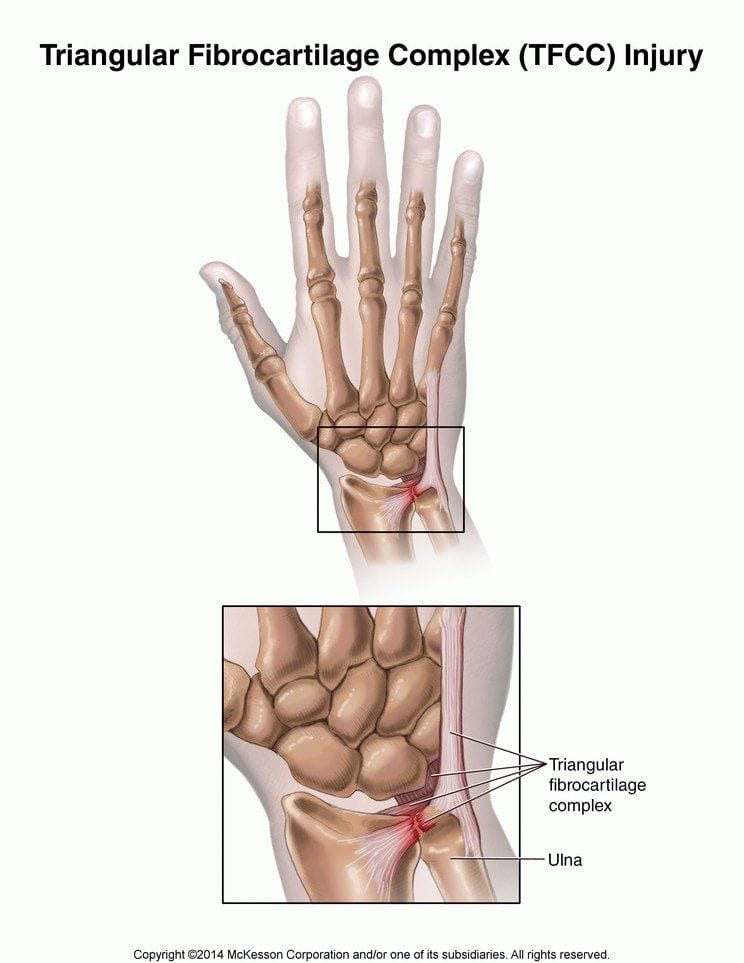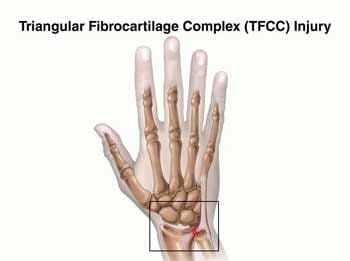Triangular Fibrocartilage Complex Injury
Patient Information
Overview
A triangular fibrocartilage complex injury is a tear of tissue on the side of your wrist. The triangular fibrocartilage complex (TFCC) is an area of cartilage and ligaments on the side of the wrist opposite your thumb. Cartilage is the tissue that lines and cushions the surface of the joints. Ligaments are strong bands of tissue that attach the cartilage to bones. The TFCC allows the wrist to bend, straighten, twist, and move side to side.

Cause
The ligaments or cartilage in the wrist can be torn from:
-
- A fall onto an outstretched hand
- A direct blow to the side of the wrist or hand
- Swinging a bat or a racquet
- A violent twist of the wrist
SYMPTOMS
Symptoms may include:
-
- Pain on the little-finger side of your wrist
- Clicking sound or feeling, or a catching feeling, when you move your wrist
Doctor Examination
Your healthcare provider will ask about your symptoms and how the injury happened. Your provider will examine your wrist and hand. Tests may include:
-
- X-rays of the wrist
- MRI, which uses a strong magnetic field and radio waves to show detailed pictures of the injured area
- Arthrogram, which is an MRI done after a special dye is injected into the wrist to outline the cartilage and ligaments
- Arthroscopy, which is a type of surgery done with a small scope inserted into your joint so your provider can look directly at your joint
Treatment
Treatment depends on how bad the tear is. Treatments may include:
-
- A splint or cast to protect your wrist
- A shot of steroid medicine to reduce swelling, irritation, and pain
- Surgery to repair the tear
- Stretching or exercises to help you heal
It often takes 8 to 12 weeks for a TFCC injury to heal. Many tears become painless with rest and time even if they don’t actually heal.
Recovery
To help relieve pain for the first few days after the injury:
-
- Put an ice pack, gel pack, or package of frozen vegetables wrapped in a cloth on the injured area every 3 to 4 hours for up to 20 minutes at a time.
- Keep your hand up on a pillow when you sit or lie down.
- Take an anti-inflammatory medicine, such as ibuprofen, or other medicine as directed by your provider. Nonsteroidal anti-inflammatory medicines (NSAIDs), such as ibuprofen, may cause stomach bleeding and other problems. These risks increase with age. Read the label and take as directed. Unless recommended by your healthcare provider, you should not take this medicine for more than 10 days.
Follow your healthcare provider’s instructions. Ask your provider:
-
- How long it will take to recover
- What activities you should avoid and when you can return to your normal activities
- How to take care of yourself at home
- What symptoms or problems you should watch for and what to do if you have them
Make sure you know when you should come back for a checkup.
TFCC INJURY PREVENTION
Many injuries are caused by falls or blows that can be hard to prevent. If you play a racquet sport, like tennis, using good technique can help prevent injury.
References:
RelayHealth. (2014). Triangular fibrocartilage complex injury of the wrist. Retrieved from https://www.summitmedicalgroup.com/library/adult_health/sma_triangular_fibrocartilage_complex/


